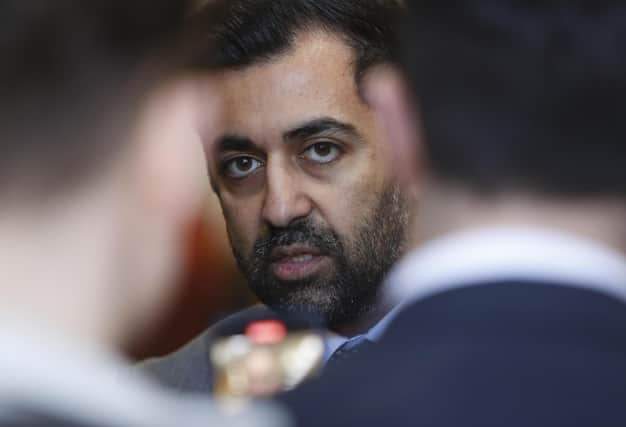Euan McColm: Humza Yousaf is on to a loser with gender bill whatever the outcome


SNP ministers would have us believe their counterparts in London fill their days scheming about how they might undermine Holyrood. If the Tories could get away with it, they tell us, they’d close down the parliament. Don’t you know there’s a war on devolution?
This cartoonish nonsense - plucky Jocks defending Scotland against malevolent, moustache-twiddling posh boys - is lapped up by the nationalists’ more excitable supporters but it takes an awful lot of effort to buy into it. The truth, as is so often the case, is rather more mundane.
Advertisement
Hide AdAdvertisement
Hide AdRather than obsessing over the powers of the Scottish Parliament, the UK Government sees the devolved administration as just another spending department. Once the annual block grant is delivered, Ministers at Westminster would very much prefer the Scottish Government to just get on with things.
First Minister Humza Yousaf is determined, however, to play the defender-of-devolution card. As the ongoing crisis in the SNP deepened, last week, he announced that he would be challenging in court the decision of Scottish Secretary Alister Jack to block Holyrood’s reform of the Gender Recognition Act.
After a majority of MSPs voted last December to make it easier for people to change their legally recognised sex - and to reduce the age at which this process may take place from 18 to 16 - Jack announced that he would invoke Section 35 of the Scotland Act to prevent the changes becoming law. This action he justified on the grounds that a change in legislation in Scotland would impact on the UK-wide Equality Act.
When Jack acted, former First Minister Nicola Sturgeon declared his decision a “full-frontal assault” on Scottish democracy. But rather than uniting voters in outrage, she misjudged the national mood. More than two thirds of Scottish voters opposed the reforms that had been backed by MSPs.
What’s more, the SNP was bitterly divided on the matter. This division was underlined during the contest to replace Sturgeon when the two candidates who opposed reform of the Gender Recognition Act - Kate Forbes and Ash Regan - got more first preference votes between them than the ultimate winner, Yousaf.
Throughout the SNP leadership contest, the party’s coalition partners at Holyrood - the Scottish Greens - made it clear that reform of the GRA was a red line for them. Forbes and Regan were conspicuously unperturbed about the prospect of the Greens walking from government. Yousaf, however, was quite clear that he saw maintenance of the grandly-titled Bute House Agreement, which brought the Greens into government, as crucial.
It’s certainly true that the agreement means the Scottish Government has a pro-independence majority at Holyrood but, beyond that, it’s not at all clear what other benefits the SNP receives from partnership with the Greens.
Regardless of one’s view of reform of the GRA, it is clear that Yousaf has chosen a fight which offers precious few political benefits. If - and it is, of course possible that this will be the outcome - the Scottish Government overturns the Section 35 order, he will have won a victory that fewer than a third of voters - and less than half of SNP members - wish for.
Advertisement
Hide AdAdvertisement
Hide AdIf, as is more likely, the Scottish Government fails in this legal challenge, Yousaf will have squandered potentially hundreds of thousands of pounds on a doomed legal fight he did not have to pick.
The current police investigation into the SNP’s finances has eroded the party’s reputation for trustworthiness. Support is plummeting and, although the nationalists remain on course to win most Scottish seats in the next General Election, Labour is back in the game.
This being so, Yousaf needs to send a clear message to voters that his priorities are their priorities. He must convince Scots that the cost-of-living crisis, the NHS, and the education system are at the top of his agenda.
Reform of the GRA simply doesn’t figure in most people’s “must do” lists.
After MSPs voted in favour of reform, it emerged that the Scottish Prison Service had run ahead of the law and was already operating a policy of self-ID for convicted criminals. This meant that rapists and other dangerous male-bodied criminals has been placed in the women’s estate.
The final weeks of Nicola Sturgeon’s time as First Minister saw her waffle and squirm through interviews about whether Isla Bryson - who, as Adam Graham, had raped two women - was female.
Sturgeon’s credibility took quite the hammering over her inability to say that, no, a man who had committed two rapes and then, facing prison, had decided to change gender was not, in fact, a woman.
It is difficult to see what political benefit there is to Yousaf - who began his First Ministership with public approval ratings of -20 - in re-opening this issue.
Advertisement
Hide AdAdvertisement
Hide AdSome of his colleagues would prefer the Scottish Parliament to return to the legislation and amend it so that there can be no suggestion of it affecting the Equality Act.
As one SNP politician put it to me, it will not benefit trans people to turn this into a risky constitutional battle. Rather, if the intention is to make it easier for people to change gender, it makes sense to do this in consultation with the UK government rather than through conflict with it.
Right now, it seems Humza Yousaf’s priority is not reform of the Gender Recognition Act but the escalation of a war against a “power-grab” that doesn’t exist.
Comments
Want to join the conversation? Please or to comment on this article.